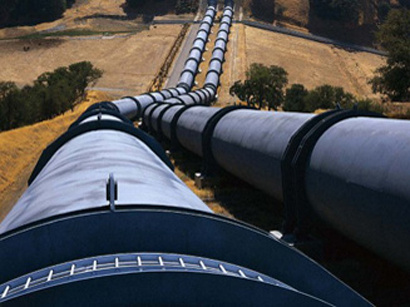SOCAR, Rosneft yet to decide fate of Baku-Novorossiysk

By Gulgiz Dadashova
Azerbaijan's state energy company SOCAR and Russian state-owned
oil company Rosneft have not yet come to an agreement on the
details of oil transportation via Baku-Novorossiysk pipeline.
It is while the date for suspension of Azerbaijani oil supplies on
this route is approaching.
An unnamed senior official of SOCAR told Trend news agency that the sides are in talks but in case they fail to reach an agreement, pumping of Azerbaijani oil through the pipeline will be suspended in February 2014.
The contract on the transit of Azerbaijani oil through the territory of its giant northern neighbor, which had been in effect for 17 years, was revoked in early May.
Russian Prime Minister Dmitry Medvedev signed an order to revoke the intergovernmental agreement, which envisaged transportation of 5 million tons of Azerbaijani oil per year via the Baku-Novorossiysk pipeline for $15.67 per ton of oil transit. The Russian government explained the decision with considerable loss.
Azerbaijan has repeatedly cited the possibility of amending the standing agreement, which would increase the volume of transported oil.
Later in July, the two companies announced that they mull several options for resuming oil operations, including reverse flow of Urals crude through the Baku-Novorossiysk northern route pipeline and oil transportation by a third party.
SOCAR's senior official further said that operation of the Baku-Novorossiysk pipeline in reverse mode would be beneficial for both Azerbaijani and Russian side.
"Its advantage for Moscow is that the Russian oil will be delivered to the Mediterranean Sea to Ceyhan [through the Baku-Tbilisi-Ceyhan] for the first time either in purely physical terms or in the form of SWAP," SOCAR official said.
Earlier, Rosneft also announced that it does not exclude reverse flow of Urals crude through the Baku-Novorossiysk northern route pipeline.
However, Russian oil pipeline monopoly Transneft -- the operator of the Baku-Novorossiysk pipeline's Russian section - announced that the decision of the Rosneft oil company to ship oil through Azerbaijan is economically inefficient.
SOCAR set terms before Rosneft on oil pumping via the Baku-Novorossiysk pipeline in the reverse mode with a sulfur content of less than one percent, which does not affect the quality of the oil transported through the BTC oil pipeline, and will allow the shipment of Azeri Light oil from the Ceyhan terminal.
The senior official went on to note that SOCAR may also increase the volumes of Azerbaijani oil pumping via the Baku-Novorossiysk pipeline to five million tons in case of preservation of its quality.
Currently Azerbaijani oil is being shipped from the Novorossiysk port under the name of the Russian export blend, URALS.
Urals -- a mix of heavy and high-grade oil of the Urals with light oil of western Siberia supplied through the Baku-Novorossiysk pipeline and the Druzhba pipeline system -- is traded on world exchanges at a price of $4 or $5 per barrel lower than the Azerbaijani crude.
Besides Novorossiysk, oil from Azerbaijan is delivered to the Georgian Black Sea port of Supsa, and from there to the Mediterranean coast of Turkey via the BTC pipeline. Both routes can fully meet the needs for pumping Azerbaijani oil.
However, maintaining oil transportation via the Baku-Novorossiysk pipeline meets the interests of Azerbaijan in terms of diversification of routes.
"Despite the relative unprofitability compared to the Baku-Supsa and Baku-Tbilisi-Ceyhan pipelines, the Baku-Novorossiysk was one of the three pipelines, which exported our oil, and a country that has no direct access to the open seas, is in need of more pipelines," SOCAR senior official said.
Earlier, SOCAR said that Baku will continue the oil transit through the pipeline if it is economically feasible. Otherwise, the supply will be halted.
The Baku-Novorossiysk pipeline (also known as the Northern Route Export Pipeline) is a 1,330-kilometer oil pipeline, which runs from the Sangachal Terminal near the Azerbaijani capital Baku to the Novorossiysk terminal at the Black Sea coast in Russia.
Here we are to serve you with news right now. It does not cost much, but worth your attention.
Choose to support open, independent, quality journalism and subscribe on a monthly basis.
By subscribing to our online newspaper, you can have full digital access to all news, analysis, and much more.
You can also follow AzerNEWS on Twitter @AzerNewsAz or Facebook @AzerNewsNewspaper
Thank you!
